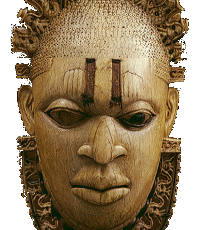Kilwa Kisiwani
Kilwa Kisiwani, just off the southern coast of today’s Tanzania, was one of many trading ports along Africa’s east coast, but for a while it was the most powerful. Between the thirteenth- and the fifteenth-centuries CE, a Muslim sultanate was established here, founded by a group of explorers coming from the city of Shiraz in today’s Iran. They established themselves as a ruling class and imposed their own culture and values on the community. In the fifteenth-century the sultanate controlled Malindi, Mombasa, Pemba, Zanzibar, Comoro and Sofala, as well as ports on the island of Madagascar. Kilwa Kisiwani was famous for its fort which served as a residence for the sultan but also as a place of trade. The residence had over one hundred individual rooms, reception halls, wide staircases and an octagonal swimming pool. Kilwa’s other main attraction was its mosque, constructed entirely out of coral stone. Ibn Battuta, who came here in 1331, was highly impressed with the way the city was laid out and with the generosity and religiosity of its ruler. [Read more: “Ibn Battuta, the greatest traveler of all time“] He also describes how the sultan went on raids to capture slaves in the interior of Africa.
By the time of Ibn Battuta’s visit, Kilwa had already been engaged commerce for some thousand years. Already the Periplus of the Erythraean Sea, a Greek manual for merchants compiled in the first century CE, mentions the ports along the eastern coast of Africa as excellent places to buy ivory and tortoise shell. Coins minted in Kilwa have been found in Great Zimbabwe, Oman and even Australia. [Read more: “Great Zimbabwe“] During excavations in the sultan’s palace, a small flask from the Yuan dynasty was discovered together with many shards of Chinese pottery. [Read more: “Dividing it all up“] Kilwa was captured by the Portuguese in 1505, but recaptured by the Omanis in the 1690s. Today only ruins are left of the once powerful sultanate.
Read
External links
- Atlas Obscura, “Kilwa Kisiwani Ruins”
- Chapurukha Kusimba and R. Oka, “Trade and polity in East Africa”
- Historic sites of Kilwa
- Internet Archive, Books by or about Ibn Battuta
- Richard Burton, Zanzibar City
- Ryo Nakamura, “Multi-ethnic coexistence in Kilwa island, Tanzania”
- Stephanie Wynne-Jones, “Creating urban communities at Kilwa Kisiwani, Tanzania, AD 800-1300”
- The National, “Were the African coins found in Australia from a wrecked Arab dhow?”
- The Story of Africa, “The Swahili coast”


